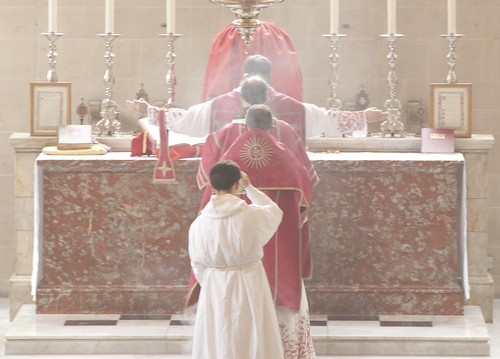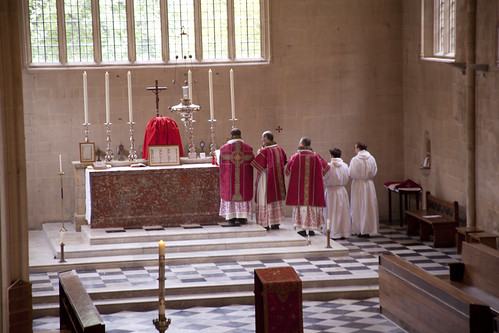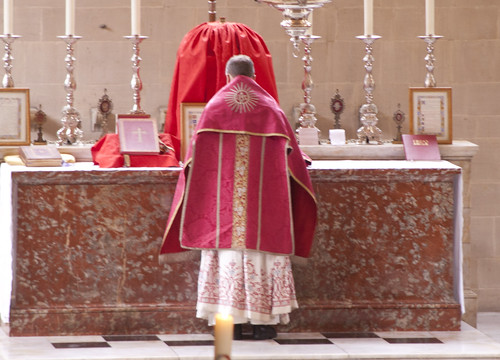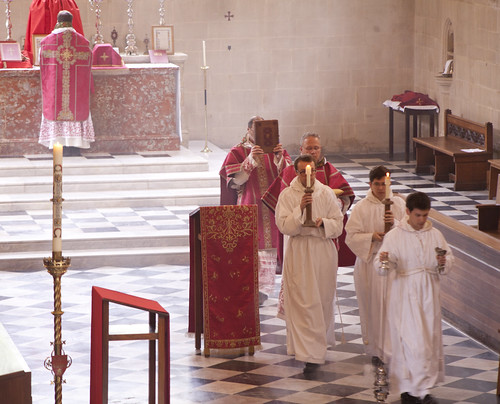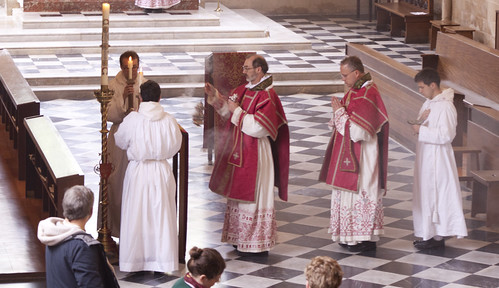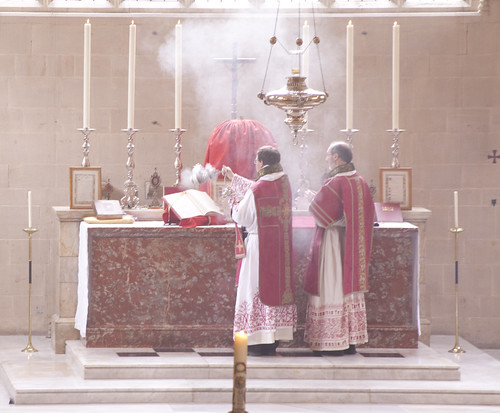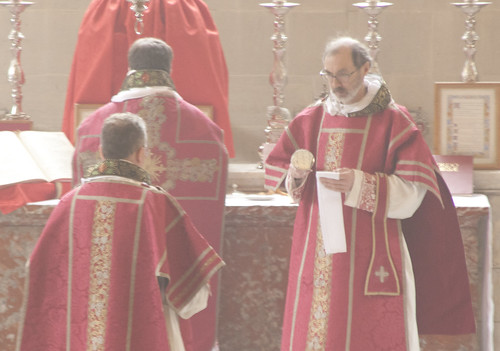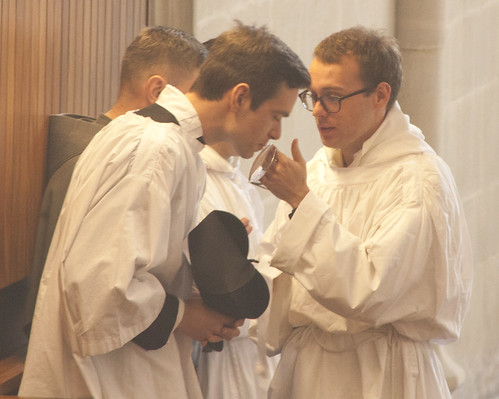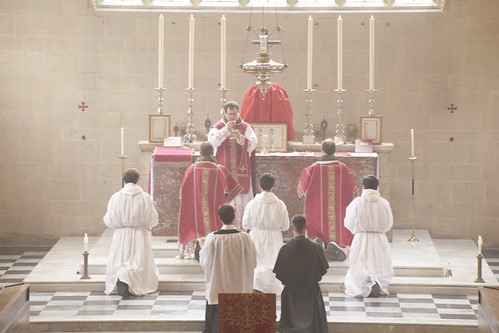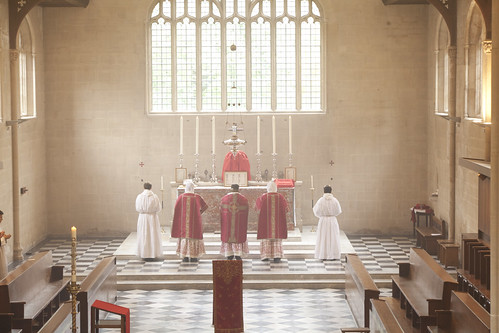Chairman's Blog
Donna Steichen on the New Age in the Catholic Church
Scholars who pruned the supernatural from scriptural interpretation on the grounds that 'modern man' could not believe it give no sign of having second thoughts as modern men and women flood into fundamentalist churches or pay thousands of dollars to seek advice from New Age mediums.
P19
Nuns who in the early 1960s had warned students not to view the sacraments as 'magical', came to embrace occult practices, implicitly if not explicitly demonic. Out of the human instinct to express faith through physical gestures, many of those who ceased to kneel for prayer began to substitute yoga postures, T'ai Chi, 'New Age' spiritualism or circular dances, widdershins, around a smoking cauldron. ... Some who denied the existence of angels found New Age 'channelling' and 'spirit guides' credible.
P22-3
Some of the New Age stuff would seem relatively harmless if it were happening outside the Church. Inside, of course, it powered a persistent attack on the Faith of ordinary Catholics, who were bewildered to find New Age spirituality replacing Catholic spirituality in sermons, retreat centres, and supposedly Catholic literature. The Neo-Pagan and Occult aspects, however, were far from harmless. Steichen witnessed serious attempts as witchcraft and goddess-worship in conferences attended to overwhelmingly by current or former female religious. She quotes a former witch:
When I was a witch, I performed rituals. I evoked spirits. I called entities. I cast spells, burned candles, concocted brews. The only thing I didn't do was fly on a broom, but I probably would have figured it if given time. But where did it lead to? Into darkness, depression and the creation of an aura of gloom around me. I was frequently under demon attack. The house where I lived was alive with poltergeist activity ... due to residual 'guests' from rituals. My friends and family were afraid of me. I knew I had no future; all I had was a dark present. I was locked in by oaths and by 'destiny'. But I had power, something I'd always wanted. It wasn't Satan's fault. He didn't exist--or so I thought. I gave it all up, and came to Jesus on my knees. ... He freed me from the oppression and gave me back my soul--the one I had so foolishly given to evil in exchange for power. .. Our salvation was bought at a great price and all we have to do is reach out for it. But we cannot serve two masters.
Carmen Helen Guerra, 'The Practice of Witchcraft', letter to the editor, National Catholic Register May 18th 1986. Quoted in 'Ungodly Rage' pp70-1.
By the end of the 1980s, attendees at quasi-Catholic 'goddess' get-togethers were clearly ageing. The exodus of female religious from the Faith, and mostly from their communities, had created a market for this stuff which wasn't going to be renewed with future generations. They tried desperately, of course, to influence ordinary lay Catholics, old and young, but insofar as their work was effective it overwhelmingly led to lapsation rather than more recruits for their internal revolution. In the meantime conservative lay groups, and the appointment of at least a smattering of conservative bishops, started to put a brake on the attempts to drag Catholic institutions into the Neo-Pagan fold.
We can look back and see what has happened since then. Ageing religious sisters, and former religious sisters, can still be found making life difficult for orthodox Catholics (and particularly for priests) in parishes, chaplaincies, retreat centres and so on. The more straightforward kind of modernism continues to destroy historic Catholic institutions, which after a generation of being not-very-Catholic are often closed down for lack of custom or officially secularised. Conservative and Traditional alternative religious communities and institutions have begun to put down roots.
Are these drawn to idolatry--to false goddesses and false prophets--seeking satisfactions largely lost to post-conciliar iconoclasm and the sterile feminist mores of American life? Do they hunger for the sacred, for the richly symbolic drama of color, meaning and mystery that has been leached out of contemporary liturgy, for the interior life so seldom mentioned in the prosaic, culturally adapted Catholicism now prevailing, for a compelling sense of ultimate purpose? The false mysticism of neo-gnostic feminism offers an illusion of these.
p118
Are traditionalists paranoid?
Over on Unam Sanctam blog, the old canard of the 'obnoxious trad' is wheeled out. Apparently the author has met a couple of priests don't like the people who come to the Traditional Mass; one has stopped celebrating it. Hmm. Maybe these Catholics were sinners, in need of the sacraments. It seems they won't be receiving them with much good will from these priests.
It has been well answered by Brian Williams at the Liturgy Guy here. Catholics attached to the ancient liturgy are accused of 'chasing' the traditional Mass from parish to parish, and not coming to other parish events. Williams points out that this is simply a consequence of the fact that they are not having their legitimate aspirations for the sacraments in the traditional forms met in any one parish, and very often have to travel long distances to attend services and events. A priest who declines to go beyond what he describes as a 'semi-regular' provision of the EF can hardly complain about that. I don't necessarily blame the priests for not doing more: I don't know what their other committments are. But by the same token no one is in a position to criticise laity for not making multiple two-hour round trips each week for extra events at a parish which has not given them a liturgical home.
Another aspect of such complaints is the claim that Traditional Catholics are over-critical or polemical. What strikes me is the double standards this exhibits. Every parish priest has a store of tales to tell about difficult Novus Ordo Catholics. They don't usually have the luxury of closing down this or that Mass, abolishing the Liturgy Committee, and throwing out the Flower Arranging Rota, because the people involved would raise a stink. The limited number of Catholics in most places attending the Traditional Mass, and the lack of fellow-feeling from Catholics in the same parish attending other Masses, not to mention the attitude of local clergy and the bishop, make them an easy target by comparison.
It would be impossible to establish empirically who are the most annoying, at the parish level, but are the kind of Traditional Catholics who attend diocesan Latin Masses really more aggressive and downright rude than their critics, at the level of public debate? This is what the post below was about, back in July 2013. Some of the voices carping about traddies noted in it have fallen silent since then; others have not.
---------------------------
Are traditionalists paranoid?
If so, our paranoia is justified.
First off are the letters pages in the Catholic press. Letter writers can act as the attack dogs of a newspaper since while editors have complete freedom to choose what to publish, they can still disclaim responsibility for it. When we find obsessives attacking trads what seems like every week, this tells you a lot about what is deemed acceptable. There is the busy Martin Elsworth, mainly in The Universe (traditionalists are 'cafeteria Catholics' for preferring the EF) and Tom MacIntyre in the Catholic Herald ('The Old Rite's individualist allure has intensified with postmodern vogues for the antique, the "retro" and the exotic in religion.'), who rejoiced in 47 letters published in just 44 months.
But what of feature articles? These are the real meat of the press.
Well, there is Dr John Casey, in the pages of The Tablet, called us 'dissidents', 'rubricists', 'ideologues' and 'misogynists'.
Nice. But Casey has got all liberal in his old age, hasn't he? Isn't that kind of vituperation to be expected?
Maybe, but we we also were edified by George Weigel characterising us in terms of 'Maniples, lace albs and Latin liturgies', and John Haldane as 'nostalgic and slavish', in the same paper
That was the The Tablet, right? That would never happen in a conservative paper, would it?
Perhaps not - until, in The Catholic Herald, Stuart Reid told us to 'abandon the Church and join the SSPX', and that we are 'not on [Pope] Benedict's team'. Not a loopy letter-writer, you understand, a man with a prestigious regular column.
I need hardly add the things which Mgr Basil Loftus lobs at us in The Catholic Times.
Ok, so that's journalism, it's tomorrow's fish-wrap. You'd never get that kind of attitude in a more permanent publication, from a respectable publisher like the Catholic Truth Society?
No - not until Dr Raymond Edwards said in one that we were characterised by a 'defensive "ghetto" mentality', and a 'fondness for dressing up', and are connected with 'hard right' and anti-semitic politics'. This is a booklet still in print.
Right, but that's just a little booklet, isn't it? I mean you wouldn't hear a proper academic dishing out silly and insulting comments about trads, would you?
Ok, so perhaps you would.
 |
| Audience at the LMS One Day Conference last year: nutters, every one of them. |
Some of the above writers have criticised liberals alongside trads, and others lump trads and conservatives together for abuse: we get it from both directions. But it goes beyond that. In terms of intensity, frequency, and the prestige of the writer and the forum, it is open season on traditionalists in a way it never is on other groups in the Church. The Tablet has never published such an extraordinary screed, like Dr Casey wrote about us, about conservatives; nor has the Catholic Herald printed anything remotely as embittered and personal attacking liberals, as the stuff provided by Stuart Reid about trads. The same is true of the letters pages, the CTS, and academics addressing conferences. It's just not done, old boy.
While this state of affairs continues, please don't accuse us of paranoia.
Rigid Young People and the Traditional Mass
 |
| 'Feed my sheep.' |
Once again the Pope has criticised 'rigid young people'. The Church is a big place and I'm sure his criticisms apply to some people. The issue of hypocritical rigid Catholics is a big theme in The Devil Hates Latin, and it may well be that Pope Francis has the kind of people in view there in mind, at least among others. The difficulty is how the tone comes over for a lot of the Catholics in the West who are actually going to read some summary of these remarks. It can easily sound as though the Pope is criticising people who take their Faith seriously, or would like to.
I thought I'd repost a section of an old, over-long post from this blog on young people and the Traditional Mass: this is below, and the post is here.
One point I'd want to stress here is when young Catholics turn up in University Chaplaincies, on Lourdes Pilgrimages, or at various organised events, the organisers have the chance, often taken, to experiment a bit. It might be charismatic-style liturgies, Taize chant, caring-sharing prayer groups, Exposition and adoration, Bible study, or any of a number of things. Some of these things will appeal to some young people and, if the Blessed Sacrament is not profaned and if the Faith is not denied, well, good for them, though there are sometimes dangers involved as well. My point is that these things are not simply the liturgy and the sacraments: they are something added to the liturgy and the sacraments, because the liturgy and the sacraments are felt to be insufficient. Insuffiently thrilling, perhaps.
When a group of young Catholics is offered something Traditional, say on an LMS Pilgrimage or the St Catherine's Trust Summer School and Retreat, or events organised by one of the Traditional Priestly Institutes, what they get is, centrally, the liturgy and the sacraments. We don't exclude all para-liturgical devotions, obviously, but the high point of what happens is the liturgy and the sacraments. Not for nothing are we the movement for the promotion of the Traditional Mass. It isn't something we've invented or adapted or composed. It is something given to us by the Church. The words of the Mass, and maybe parts of the Office, and of traditional devotions like the Rosary and Benediction, which are on offer at these events are not ours, they are the Church's words. The sacraments of the Eucharist and of Confession have power, not from our cleverness, but from Christ. If the Catholic Church has anything to offer, she offers it through the liturgy and the sacraments. We are not going to go wrong in offering people these things, using the forms and the language used by the Church for many centuries.
Those who would like encourage pastors with the care of young people to offer them every exotic fruit of experimentation, inspiration, or even syncretism, but not the Traditional Mass, I wish they would stop and think about what they are doing. They would say that the Traditional Mass takes people away from the mainstream Church. But why aren't they offering people what the Church offers them?
---------------
Reposted, in part, from Sept 2014.
The question, to repeat, is not what the young people are explicitly asking for, since they don't, usually, know what the options are. The question is what they make of what they are offered. Some will like the evangelically, charismatically, groove, though I do wonder what happens to them when they feel they are getting a bit old for it. This problem isn't limited to the Catholic experience: if Holy Trinity Brompton is full of under-30s, and has been for 30 years, what's happens to them when they reach 30? At least a proportion of them lapse with a life-long inoculation again Christianity, which they regard as juvenile, anti-intellectual, and embarrassing, a phase in their lives they'd rather not talk about.
Do young people respond to the Traditional Mass and traditional devotions? A good number of them do. These are available in such a limited number of places that it is impossible to make a scientific appraisal, but for many young people the experience of the Traditional liturgy is a life-changing revelation. They may grow out of it, a few certainly move on, but what we don't need to worry about is it being a fad fuelled by dubious religious emotion. It appeals to the heart, through the music and ceremonies, it appeals to the intellect, through the texts and the theology, but above all it is all about the public prayer of the Church and the Sacraments.
My experience of talking to the young people who came to our Mass in the Slipper Chapel at Walsingham, a young lady and a man, who said that it was a huge relief after the Youth 2000 experience, mirrors conversations I have had with masses of young people, and their pastors, over the years. To repeat the obvious, very few Catholics under 40 have even heard of the Traditional Mass: it is a completely closed book to them. For many, nevertheless, when they stumble across it, it is exactly what they have been looking for. For others, it answers questions, historical and spiritual, they have been asking for a long time. Others find in it, after a bit of getting used to it, an approach to spirituality which is uniquely satisfying. Such, of course, was my own personal experience as well.
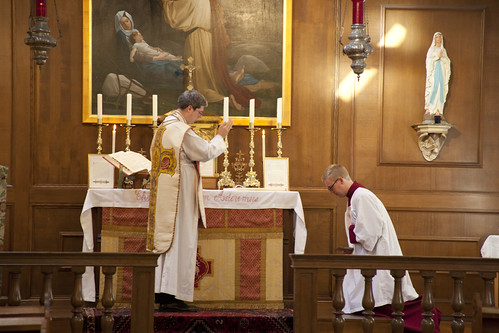 |
| One of two EF Low Masses celebrated at the Evangelium Conference last time I was there. Each morning. |
I'm glad to say that the Traditional Mass is beginning to creep in as an option in some of the settings where young Catholics are to be found in numbers. You will find it at meetings of the Faith Movement, at the Evangelium Conference, at the forthcoming SPUC conference, and in a growing number of University chaplaincies. It is still a bit marginal, usually, the early morning 'quiet Mass' option, but it is a start. Let's not forget what Pope Benedict XVI said of it:
... it has clearly been demonstrated that young persons too have discovered this liturgical form, felt its attraction and found in it a form of encounter with the Mystery of the Most Holy Eucharist, particularly suited to them.
Support the work of the LMS by becoming an 'Anniversary Supporter'.
Masses in Limerick: Letter in The Tablet
 |
| Not available in Limerick? |
Last weekend The Tablet reported on the alleged fact that the previous Tuesday had not seen any public celebrations of Mass in the Diocese of Limerick. The headline connected this with a shortage of priests, but the text of the story took a quite different line, pointing out that the diocese has no fewer than 108 priests. Surely one or two could have said a public Mass? The reason they didn't is that they were all involved in a training day. So there were lay-led eucharistic liturgies instead.
According to Catherine Kelly, general manager of Limerick Diocese, the liturgies are one of the many initiatives from last year’s synod. The diocese is offering people opportunities to have “greater involvement in the Church, greater leadership [and] greater ownership”, she said.
“The Church we all grew up with could be viewed as a train,” said Bishop Leahy, “a locomotive pulling many carriages behind it. That is not fit for purpose today. We all need to be engines of the Church, out there, working for others, doing good work”.
An interesting attitude. What the Protestants couldn't do, the liberals have done. Anyway, this weekend The Tablet have published a letter of mine:
Your report on the Mass-less Tuesday in the Diocese of Limerick gives the impression that it was not just an unfortunate coincidence, but a deliberate stunt to promote lay-led Eucharistic liturgies. Let us hope that the bishop of Limerick does not see his role as depriving his people of the sacraments, instead of feeding his flock, which would indeed be strange if true.
In any case, the report was false. The church of the Sacred Heart in Limerick, sold to developers by the Jesuits in 2006 and re-opened for worship by the Institute of Christ the King Sovereign Priest in 2012, had Mass at 8am and at 7pm, and also times for Adoration and Confession. No doubt it didn't appear on the radar of the diocesan employee quoted in the story because, although the Institute works in the diocese with the permission of the bishop, they celebrate Mass in the Extraordinary Form.
Yours sincerely,
Joseph Shaw
Chairman, The Latin Mass Society
Support the work of the LMS by becoming an 'Anniversary Supporter'.
Bullying and ostracism from the Catholic Education Service
 Copies of a guidance document entitled 'Made in God's Image', on homophobic bullying, from the Catholic Education Service are doing the rounds. It is going to be sent to Catholic schools soon but Mark Lambert has put the pdf on DropBox and made a few comments.
Copies of a guidance document entitled 'Made in God's Image', on homophobic bullying, from the Catholic Education Service are doing the rounds. It is going to be sent to Catholic schools soon but Mark Lambert has put the pdf on DropBox and made a few comments.
The document has both superficial and deep problems. Superficially, I'm suspicious of documents which don't include the names of the people who drew them up, or indeed the name of anyone willing to take responsibility for it. This document has the logos of the CES, St Mary's University, and the Aquinas Centre for Theological Literacy on it. Is it actually endorsed by these institutions? (Did St Mary's ask its governing body to vote on it? I hardly think so.) Where does it come from? Who paid for it? Who composed it? No matter, the CES is promoting it, maybe that is all we need to know.
Again, this is a 37-page document on homophobic bullying, which sets out lesson plans for eight 50-minute lessons to be devoted exclusively to this topic. What about other forms of bullying? What about other forms of bullying which target 'protected characteristics' under English law? No doubt the CES has policies on all these things but there is no sense of an integrated approach here. How does this fit in with Sex Ed, Religious Studies, or anything else? It is not even clear what teachers are supposed to deliver these lessons, which make frequent reference to gospel passages, but stray into history, current affairs, and Sex Ed. In some places the reader gets the impression that it would be PE teachers who are most relevant to the issues raised.
But again, maybe that's not so important. After all, I've no doubt homophobic bullying is perfectly real, and needs to be addressed in our schools. Here is a document which aims to do that. So how does it set about it?
First, some definitions.
'Homophobic bullying is bullying that is based on prejudice or negative attitudes, beliefs or views about lesbian, gay or bi people.' (p3)
Again (p23):
Homophobia is the fear, dislike or hatred of gay people. Bullying involves excluding, humiliating or threatening people. Therefore homophobic bullying is when someone is excluded, humiliated or
threatened because they are (or people think they are) gay.
A US government website on bullying gives us a more complete definition of bullying:
'Bullying is unwanted, aggressive behaviour among school aged children that involves a real or perceived power imbalance.'
Although the document gives examples of bullying as well, it is not bullying which is the real target here. Nor, in fact, is homophobia. The child who says 'those trainers are so gay' is not, necessarily, a homophobe: such a remark does not suggest, much less prove, that he or she has a fear or dislike of gay people. As noted, this use of language is, like the use of profanities, regrettable, but what is even more regrettable is the judging and labelling of children, to be followed by their exclusion, humiliation, and threatening, on the basis of their careless use of language.
The attitude of the father in the later example is not clear, because we don't actually know if he is using the word 'gay' to denote orientation, lifestyle choice, or cultural and political advocacy. The very fact that he knows a media personality is 'gay' suggests that it is not just a matter of orientation. Celebs 'come out as gay', generally speaking, as a cultural and political gesture. However, the case is clearer in another example in the document (p26).
She sighs and says that Andrew is old enough to know now: Uncle Michael is gay and has been living with his boyfriend for the last five years. His mum is looking really upset. ‘That sort of thing isn’t right, Andrew, and I’m not having it – living with a man, for God’s sake! I wouldn’t be exposing you to that nonsense. He knows the family doesn’t approve of him and he just goes right ahead and does it anyway.’
Andrew is surprised, and even more confused. ‘So that’s why you don’t like him anymore? Just because he’s gay? Why?’
‘It’s wrong, Andrew. Now just leave it, will you?’
Here we have a clear example, and presumably it is supposed to be a clear example, of an attitude towards someone based on transgressive public behaviour. Uncle Michael has adopted a lifestyle at odds with the moral law, and Andrew's mother does not want her son to be exposed to this behaviour. This is given as an example of homophobia.
The authors of 'Made in God's Image' are playing a dangerous, if familiar, game. Fear and hatred of 'gays' is wrong, they say, and few indeed would disagree. The Church's teaching on sexuality can still be taught in Catholic schools, they say: and isn't that nice? But when it comes down to it, being influenced by that teaching just is homophobic. To distance oneself from wrongful public behaviour cannot, we are told, be separated from the idea of fearing and hating a whole category of people, on the basis that some of the people in this category might on occasion behave wrongly.
On the same argument, if Uncle Michael was a remarried divorcee having a string of affairs, then any objection by Andrew's 'mum' to going round to see him with her children would count as heterophobia. Somehow the authors of this document would deny that this conclusion follows. It doesn't make sense. It doesn't have to make sense. This is gaslighting.
The classroom discussions proposed by the 'Made in God's Image' (p22), are, for people eschewing all judgmentalism and accepting everyone as they are, extraordinarily manipulative. Having started from the assumption that homophobia is deeply bad, pupils are invited to discuss in small groups a series of possibly-homophobic scenarios. This set-up is bound to push the pupils to taking the widest possible view of homophobia. Who wants to be the one to say: 'I don't think this case is homophobic', thereby providing evidence that they are themselves homophobic? What a gift to the classroom bully, whether child or teacher, any such evidence would be.
This document is not about combating bullying. It uses the real suffering of one set of bullying victims to justify using the extremely one-sided power relations between managers and teachers, and between teachers and pupils, to indulge in a bit of bullying of its own. It claims to be against judging people, but it advocates taking a child's most careless word as evidence of moral failings. It claims to be about 'accepting' people in accordance with the teaching of the Church, but there is no acceptance of people who take seriously Catholic teaching on sexuality.
In pursuit of this agenda, the message of the Gospel is bent completely out of shape. 'Made in God's Image' tells us (p.18) that Jesus refused to judge people and told us not to judge anyone. Nowhere can it be admitted that Jesus condemned the lake-side towns, Jerusalem, or the Pharisees, for their failings; that he said 'For the Father judgeth no man, but hath committed all judgment unto the Son' (John 5:22), nor yet that that he passed on this right and duty to judge to the Apostles, who would 'sit on thrones and judge the twelve tribes of Israel' (Luke 22:30); nor, indeed, that he said that sexual sins 'defile a man' (Mat 15:19), and exclude people from heaven.
The characterisation of the Pharisees themselves is grossly historically biased, and the references to ancient and modern Jewish practice (p17) could be construed as anti-semitic.
Nor can it be admitted clearly that Christ's reaction to the 'sinner' who washed his feet with her tears was connected with her repentance of her sins. Instead, the children are invited 'meditate' on a version of the story in which this inconvenient word is not used, using techniques familiar to practioners of yoga and hypnosis (p19):
Close your eyes, relax your shoulders, take a moment to notice sounds around you and let them go. Breathe out any tension in your body and when you are ready, allow yourself to gently enter the scene from the story, ...
I think Catholic parents at this point are entitled to ask the Catholic educational establishment: who gave you the right to manipulate my children and turn them against the moral guidance of their parents?
Support the work of the LMS by becoming an 'Anniversary Supporter'.
Dominican High Mass for St Peter Martyr: photos
Last Saturday Oxford's Dominicans celebrated a High Mass; it was the feast of St Peter Martyr in the Dominican calendar.
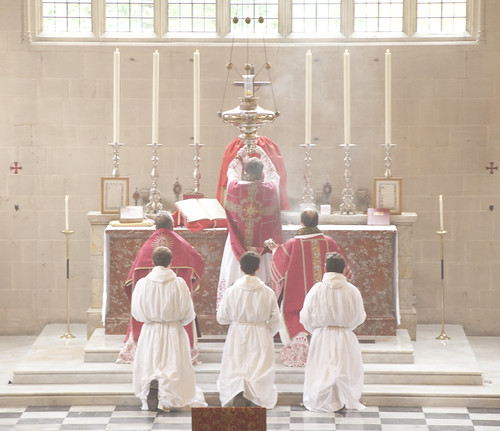
As Mass progresses, the incense increasingly clouds my photos of the sanctuary, taken from the choir loft.
Support the work of the LMS by becoming an 'Anniversary Supporter'.
Novel: The Devil Hates Latin
 I've just read a new novel, a first novel, with a Catholic theme: 'The Devil Hates Latin' by Katharine Galgano. It is being published by Regina Magazine. It is really more of a thriller than anything else, involving both the corruption and the graces which characterise the Church of today, and of all ages.
I've just read a new novel, a first novel, with a Catholic theme: 'The Devil Hates Latin' by Katharine Galgano. It is being published by Regina Magazine. It is really more of a thriller than anything else, involving both the corruption and the graces which characterise the Church of today, and of all ages.
You can buy it here (UK) and here (USA).
Something we need to try to keep hold of today is the interplay in the Church, and in the world as a whole, of really terrible bad things, and the action of God. I think Catholics can handle this better than Protestants, as long as we manage to escape the historically Protestant idea that the Church is or should be the community only of the saved. Of course the Church contains sinners, chancers, the ambitious and the corrupt, and some of these will attach themselves to positions of prestige in the Church because they like the idea of the prestige and the money and influence that it might bring. The Church also contains the lukewarm, and people who have made all sorts of compromises without ever saying to themselves that they no longer believe.
Into this endlessly complicated situation the Devil seeks to bring souls to Hell, and God works his grace, especially through the sacraments. It is a battle fought by all of us, day by day, Mass by Mass, confession by confession, temptation by temptation. Galgano presents this in a highly dramatised form, which is hugely fun to read, but also also says something fundamentally true about the fallen human condition, with some pithy insights into culture, politics, and the Church.
You can buy it here (UK) and here (USA).
Support the work of the LMS by becoming an 'Anniversary Supporter'.
New Book: 'Gradual' by Berkely and Scotland
| From the Moretus Gradual, 1598 |
I've just purchased a read an intriguing, short book on the restoration of rare, late-16th century printed Gradual: a collection of chants for the Church's liturgical year. The Gradual in question was beautifully printed in the Spanish Netherlands, using hand-copied monastic chant books as its sources.
The chant notation (shown, left) looks very like that used in the editions most singers use today, though it used five staves and lacks some of the specialised note-shapes (singers will note that there don't seem to be any quilismas or liquescents). Again, it (obviously) doesn't include the editorial marks added by the monks of Solesmes to most modern editions.
Although the melodies are somewhat different from the ones used today, which have been restored by reference to the oldest available manuscripts, they are quite different from the simplified and clunkily-printed chant used immediately before the Solesmes-influenced 1907 Graduale Romanum, upon which later editions have been based, exemplified by the 1870 Pustet edition shown below.
 |
| From the Pustet Graduale of 1870 |
The story of the restoration is fascinating, as it the discussion of the place the Gradual had in the
Counter Reformation programme of restoration in the Spanish Netherlands.
The book, Gradual by Julian Berkely and Tony Scotland, is available, with a pre-publication discount, at £13 from Shelf Lives (inc UK p & p) up to Mon 15th May; thereafter it will be bookshops, including John Sandoe in London, at £15, or from Amazon at £16 (inc UK p & p).
 |
| From the 1961 Graduale Romanum |
The book's blurb:
An illustrated monograph about the rescue, restoration and history of a monumental book of early printed Gregorian Chant, and its continuing use in the revival of the traditional Latin liturgy. The Gradual of the title, containing the chants of the Mass, was published by the great Renaissance printer, Jan Moretus, at the Plantin Press in Antwerp in 1598. This was the supreme achievement of a new technology supplanting the art of illuminated manuscripts – and an act of defiance by a Church besieged by the Protestant forces of the Reformation.  While the Dutch War of Independence raged around Antwerp, the Plantin Press spared no expense in creating this important and infl uential work, sending copies throughout the Catholic world to keep the Divine Office alive, and to raise the spirits of the recusant faithful. Among these were the aristocratic English women who fled Elizabeth’s persecutions for the relative safety of the Spanish Netherlands, and founded a Benedictine convent in Brussels, under the abbacy of Dame Joanna Berkeley. The ancient Chants which the Brussels Dames sang from their Moretus Gradual more than four hundred years ago had already survived a millennium – and are drawing a new generation of young people today.
While the Dutch War of Independence raged around Antwerp, the Plantin Press spared no expense in creating this important and infl uential work, sending copies throughout the Catholic world to keep the Divine Office alive, and to raise the spirits of the recusant faithful. Among these were the aristocratic English women who fled Elizabeth’s persecutions for the relative safety of the Spanish Netherlands, and founded a Benedictine convent in Brussels, under the abbacy of Dame Joanna Berkeley. The ancient Chants which the Brussels Dames sang from their Moretus Gradual more than four hundred years ago had already survived a millennium – and are drawing a new generation of young people today.
Support the work of the LMS by becoming an 'Anniversary Supporter'.
Colloquium on Limbo in Ramsgate, 30th June-1st July
 |
| Dante visiting the First Circle of Hell: limbo, where the souls of good pagans, like the ancient philosophers, enjoy a state of peace and natural happiness. |
DR LAWRENCE FEINGOLD; FR ANDREW PINSENT; DR JOHN A. DEMETRACOPOULOS; FR JOHANNES MARIA SCHWARZ; DR ALYSSA PITSTICK
Theme:
The doctrine of Limbo has been a subject of controversy for nearly seventy years. What is the state of those who depart this life with original sin only? Is it possible to maintain that no souls do depart this life in such a way? Intimately tied to the question of the 'natural desire for God' and to the dispute over the necessity of faith in Christ for salvation, Limbo occupies a strategically vital position in the theological landscape.
New on the Order of Malta
 |
| Image h-t Andrew Cusack |
The election of a new Grand Master of the Order of Malta in Rome on Saturday - tomorrow - has precipitated an avalanche of news stories, many containing intriguing claims about the root causes of the shock resignation of the last Grand Master, Fra Matthew Festing.
The most interesting aspect, which has been revealed already in part by past postings by Steve Skojek at One Peter Five, is the role of money in the saga of the Knights. The claim is that because Order was a beneficiary of a shadowy trust based in Switzerland, the attempts by Fra Matthew Festing to get to the bottom of this trust and ensure that the law was followed threatened to precipitate revelations which would be embarassing to people in positions of considerable influence in the Vatican. Festing had to be removed in order to remove this threat. The interim leadership of the Order has, at any rate, rapidly come to an amicable agreement with the trustees of this trust and we may now hear no more about it.
Pope Francis' alleged role in this reminds me very much of the role of Pope Benedict and Pope John Paul II in various Vatican scandals: that of trying to keep a lid on a situation which he cannot ultimately control. Pope Benedict was, frankly, defeated by the problems at the Vatican bank, and Pope John Paul by the clerical abuse problem. I don't think any of these popes were personally implicated in wrongdoing. What none of them allowed, however, was a big melt-down involving the public disgrace of senior officials and the publication of a lot of embarassing information. Such a thing is almost unthinkable in the Vatican, but it may in fact be the only thing which would actually resolve the problem,
Here is a selection of news stories:
One Peter Five: Fr Matthew Festing has decided to go to Rome for the election despites attempts to stop him
Church Militant: several strands about the current situation and its causes
Lifesite News: members of the Order petition Pope Francis for an explanation of his unprecedented intervention in the Order
Edward Pentin in Catholic Register: Vatican allows Festing to attend the election after all


